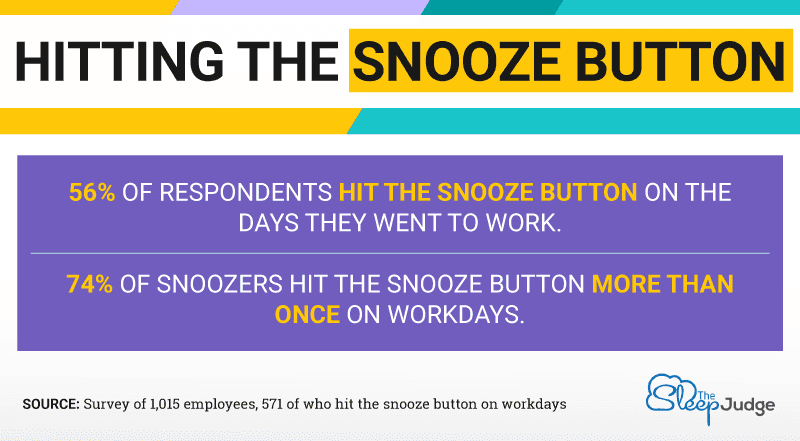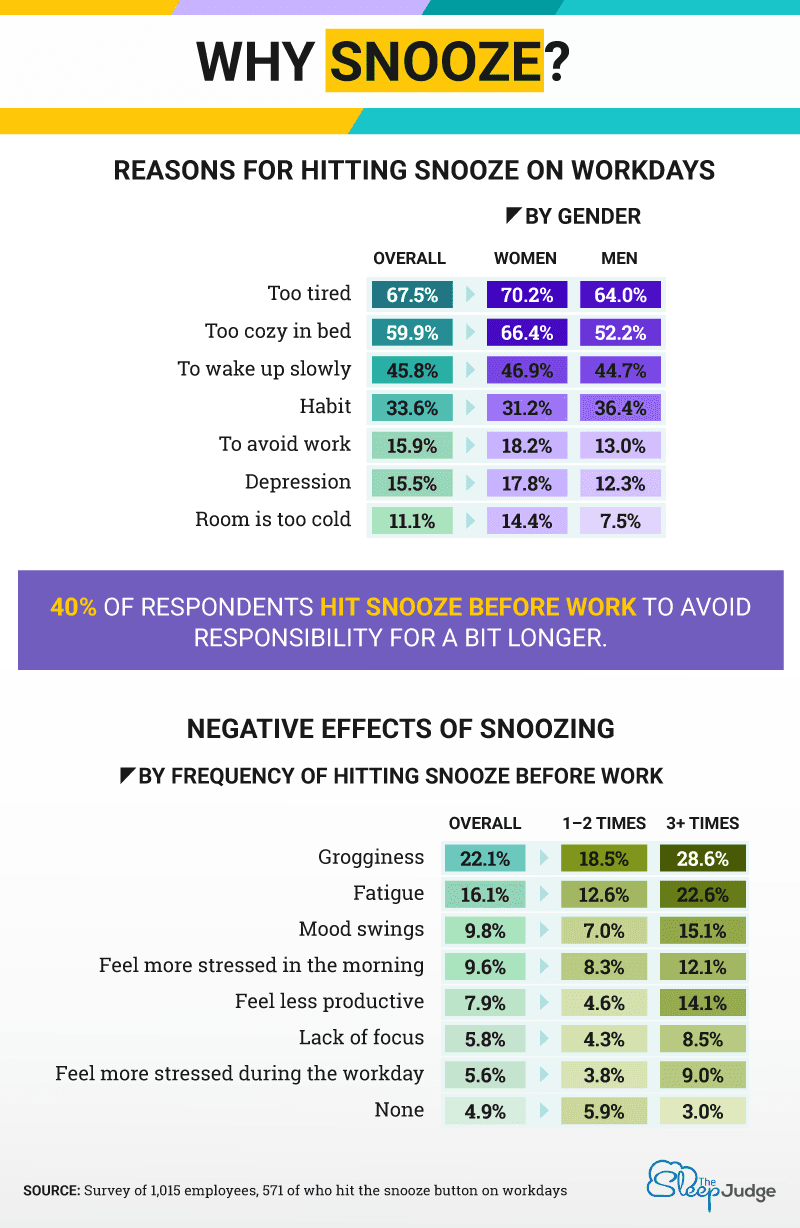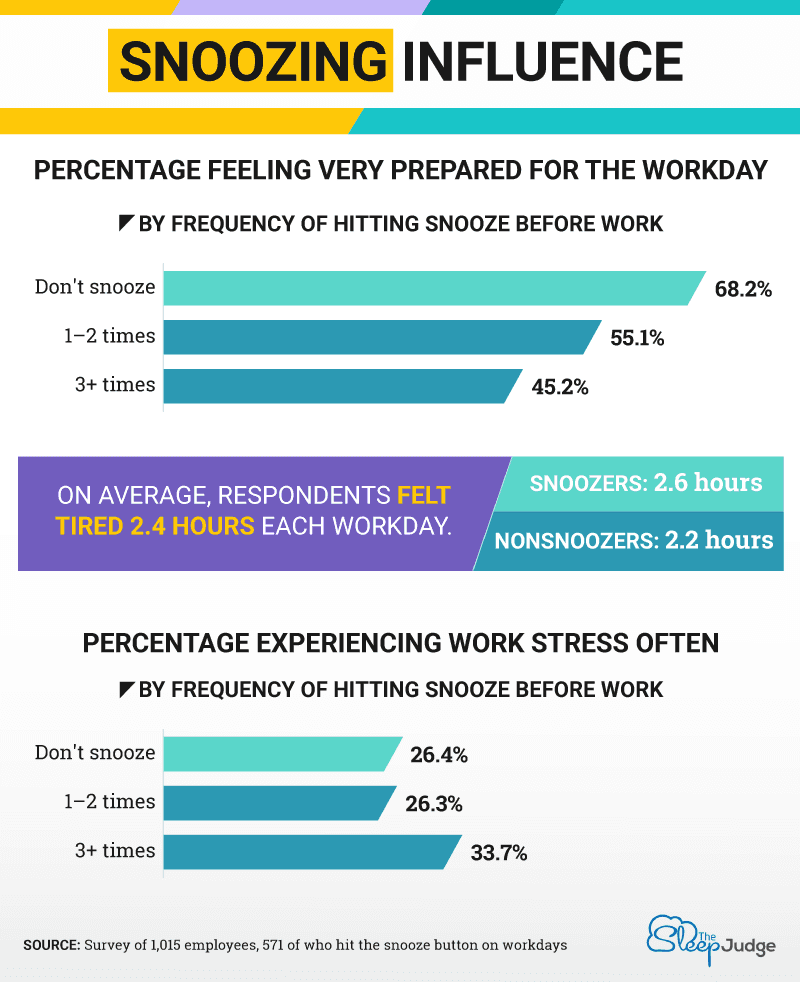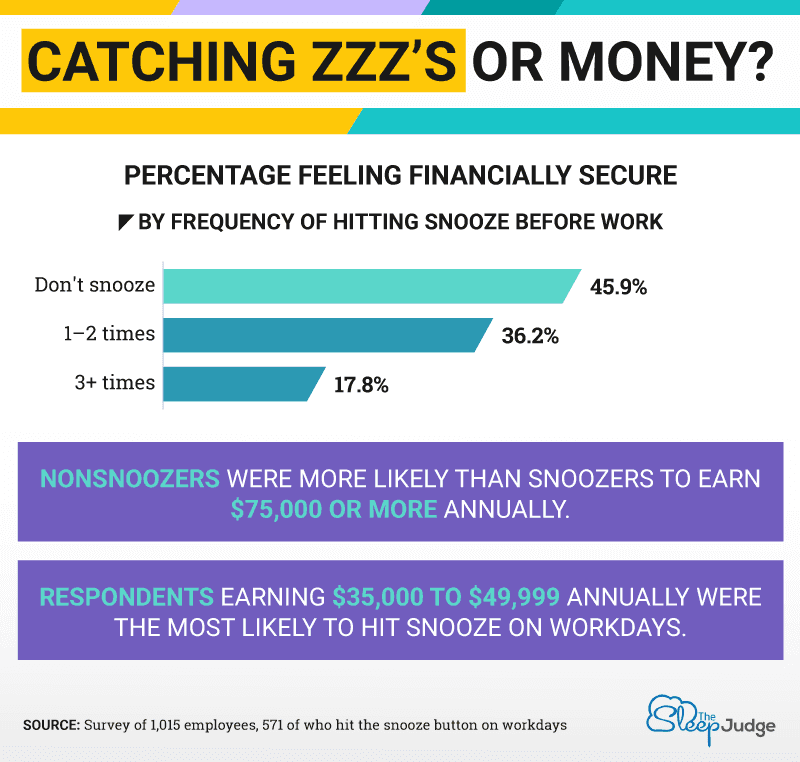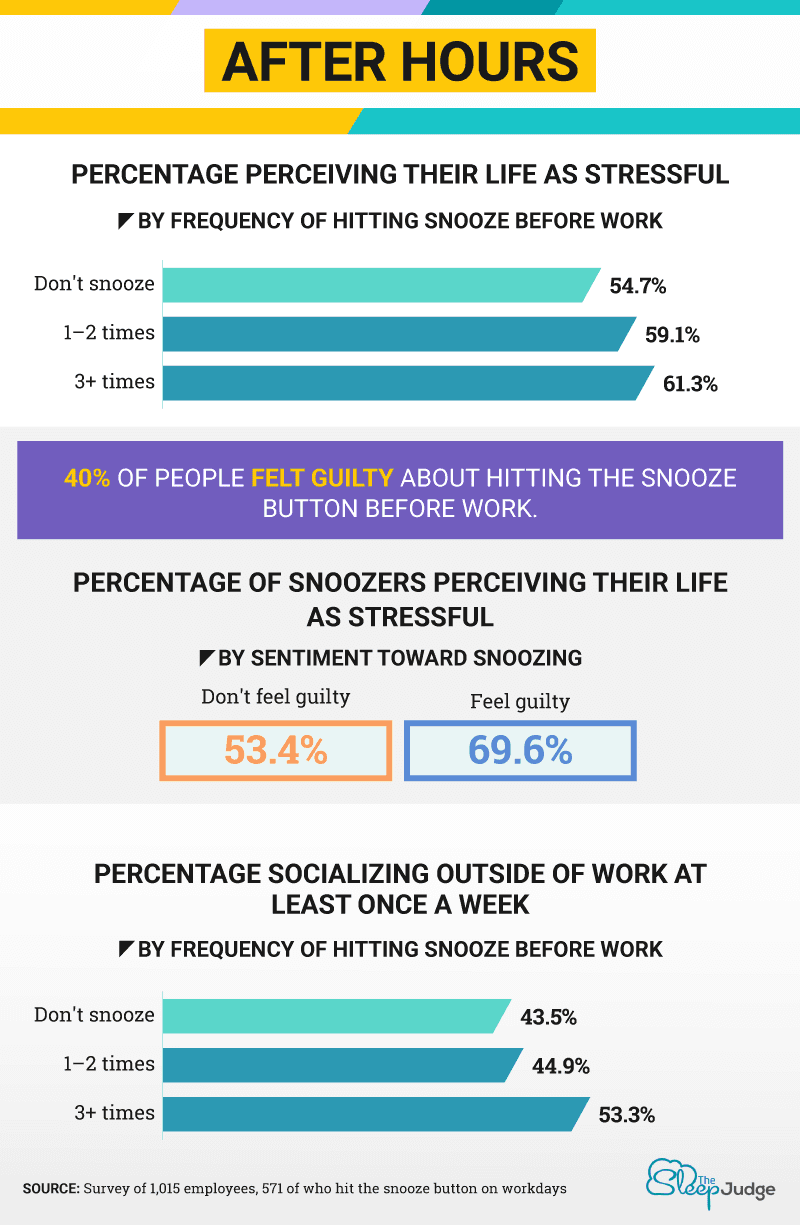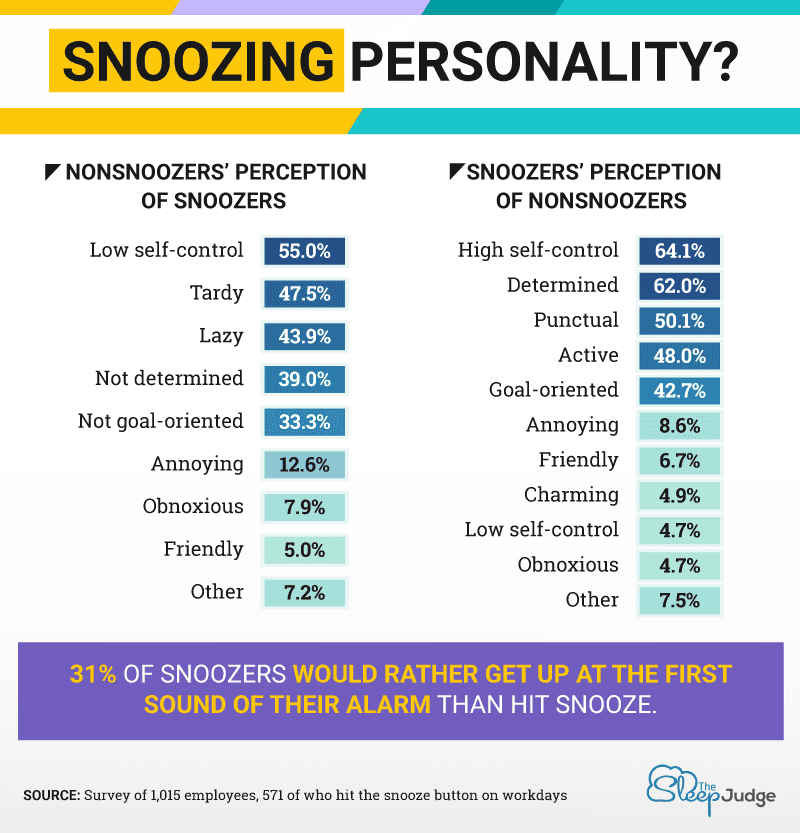The slow rise of the sun and the sound of birds used to shake people from their sleep. But now, the natural process has been replaced by jarring noises, blasting radios, and constant beeping. Despite how loathed and annoying alarm clocks are, though, many people rely on them. Without this technology pulling us from our slumber, most people wouldn’t be able to make it to work or school on time or fit in that early morning workout.
You Snooze, You Lose?
But the ever-so-hated alarm clock comes with one life-saving button: snooze. Staying awake after the first set of alarms is difficult for a significant amount of people, and the thought of “just five more minutes” had 56% of people hitting the snooze button on workdays and 74% hitting it more than once. Hitting snooze and clocking in a few more minutes of sleep may make people feel slightly better about waking up, but is it actually helping?
With studies building up evidence against hitting that tempting button, we were curious about how snoozing impacts career performance, financial success, and stress. We surveyed over 1,000 employees to understand the effects of the snooze button and if a few extra zzz’s are worth what comes next. Keep reading to see what happens when you don’t snooze.
Back to Sleep
The Centers for Disease Control and Prevention (CDC) recommends at least seven hours of sleep every night for the majority of adults, but even when people clock in seven hours, they often still wake up tired. Thanks to a phenomenon called “sleep inertia,” mornings are filled with the intense need to go back to sleep and grogginess. Waking up abruptly – hello, alarm clocks! – is the most common cause of sleep inertia and likely why 67.5% of respondents said being “too tired” was their top reason for hitting snooze on workdays.
Across all of the reasons for hitting snooze on workdays, including being too cozy in bed and wanting to wake up slowly, women were more likely than men to delay waking up – with one exception. Compared to 31% of women who said they snoozed because it had become a habit, over 36% of men said the same.
Hitting the snooze button disrupts REM sleep and had nearly 50% of people feeling groggy, fatigued, and/or moody – symptoms that significantly increased with the number of times the button was pressed.
More Snooze, More Stress?
Even though alarm clocks are vital for most people to get to work on time, they can prevent us from waking up feeling refreshed. Hitting the snooze button only makes matters worse by tricking your brain into entering the first phase of the sleep cycle and then jerking you awake just minutes later.
This confusion can, therefore, impact the feeling of preparedness for the workday – while 68.2% of those who said they don’t hit snooze felt very prepared to clock in at the office, only 55.1% of those who snoozed once or twice felt very prepared, and 45.2% of those pressing it at least three times said the same. Hitting snooze three or more times also increased the amount of work stress employees experienced, with over one-third feeling stressed at work often.
The amount of sleep needed to perform at one’s best didn’t change based on the job position, and neither did the tendency to press snooze. While senior-level and executive employees were the least likely to hit snooze in the morning, the difference was incredibly slim.
Pays to Be Early
Aside from stress, grogginess, and fatigue, hitting snooze for some extra zzz’s might also cost employees a pretty penny. Nonsnoozers were more likely to earn at least $75,000 each year.
Of course, hitting snooze doesn’t send an alert to the boss or cause a decrease in one’s salary, but the benefits of waking up at the first alarm may help employees perform better and lead to greater rewards in the office. Financial security was the highest among those who didn’t snooze and decreased drastically as the number of snooze button hits increased.
Sleep, Stress, and Socializing
Stress and sleep have a close relationship, and while most people believe high stress leads to poor sleep, the relationship works both ways. Sleep disturbances lead to physical and mental consequences, including mood changes. Hitting the snooze button just once can increase stress, but hitting it multiple times worsens stress even more – while just under 55% of those who didn’t snooze perceived their life as stressful, nearly 60% of those hitting snooze once or twice per workday felt stressed, and 61.3% of those hitting snooze at least three times said the same.
Despite the tendency to succumb to extra sleep in the morning, it seems people know snoozing isn’t the best way to wake up. Forty percent of people felt guilty for hitting the snooze button before work, and those who said they felt guilty were also significantly more likely than those who didn’t to perceive their life as stressful.
The fatigue that comes from hitting snooze may last the entire day, but that doesn’t seem to stop people from going out after work. Those who said they don’t snooze were the least likely to socialize outside of work at least once a week, while more than half of those who said they snooze three or more times each workday headed out with friends or co-workers at least once a week.
Smashing Snoozers
Morning routines often split people into two opposing categories: morning people and nonmorning people, snoozers and nonsnoozers. And while morning routines can tell a lot about a person, our perception of others is not always accurate. Nonsnoozers tended to have a negative perception of snoozers, thinking of them as having low self-control and being tardy, lazy, and undetermined. On the flip side, snoozers praised nonsnoozers, thinking they had high self-control and were determined, punctual, and active.
Perceptions of snoozers and nonsnoozers, however, may have less to do with negative or positive personality traits and may just be rooted in basic biology. People who have increased difficulty waking in the morning may have their genes to blame – a genetic mutation that slows the circadian clock causes some people to stay up late and have more trouble waking in the morning. Hitting the snooze button may also be a response to sleep inertia, which everyone can experience after waking, especially when waking up is abrupt. Rather than pointing fingers and attaching negative labels to those who snooze, acknowledge the underlying factors, and consider the effects of sleep deprivation.
Skip the Snooze
Alarm clocks are a gift for early risers and a torment for the sleep-deprived – but regardless of which category people fall into, hitting the snooze button for just a few extra minutes of sleep is always tempting. Years of scientific research and firsthand accounts have made it clear that snooze buttons are the enemy of our health.
From grogginess and fatigue to mood changes and increased stress, the drawbacks of snoozing are clear. However, the consequences of trying to get some extra zzz’s go further than just a few hours of feeling tired. Not only do snoozers perceive their life as more stressful, but they also earn lower salaries, feel less financially secure, and feel more guilty about their morning behavior.
Hitting snooze clearly doesn’t help people clock in more quality sleep, but there are plenty of ways to ensure your sleep in undisturbed so that you can wake up refreshed. At The Sleep Judge, we’re here to help you make the most of your nights. Whether it’s picking the best mattress and pillows that fit your needs and sleeping style or suggesting lifestyle changes that can truly help your sleep cycle, we have everything you need to get a good night’s rest. To learn more, visit us online today.
Methodology and Limitations
For this project, we surveyed 1,015 employees on their wake-up behavior on workdays. 571 respondents reported hitting their snooze button on mornings before work. 444 people didn’t snooze, 372 hit snooze one to two times, and 199 hit snooze three or more times. 541 respondents worked in entry-level and associate positions, 373 worked in mid-level positions, and 101 worked in senior-level and executive positions. The income groups were distributed as follows among respondents: $24,999 or less: 191 people; $25,000 to $34,999: 160 people; $35,000 to $49,999: 216 people; $50,000 to $74,999: 244; and $75,000 or more: 164 people.
Respondents ranged in age from 18 to 75 with an average age of 36 and a standard deviation of 10.9. Fifty-one percent of respondents identified as men, and 49% identified as women.
Our data rely on self-reporting by the respondents and are merely explanatory. No statistical testing was performed. The data are not weighted.
Fair Use Statement
Do you want to share these findings on snoozing habits and their impact on work and social life? The graphics and information found on this website are available for noncommercial reuse. Feel free to share them as much as you’d like across the web, on social media, and at the office, but please make sure to link back to this page. Thank you!
Sources
- https://slate.com/human-interest/2017/03/waking-up-with-your-smartphone-in-the-morning-is-convenient-but-is-it-wise.html
- https://www.businessinsider.com/snooze-button-effect-on-sleep-2017-5
- https://www.cdc.gov/sleep/about_sleep/how_much_sleep.html
- https://www.verywellhealth.com/how-does-sleep-inertia-make-it-hard-to-wake-up-3014826
- https://www.sciencealert.com/hitting-the-snooze-button-does-not-give-us-any-extra-restorative-sleep
- https://www.verywellhealth.com/best-ways-to-wake-up-3014993
- https://www.independent.co.uk/life-style/health-and-families/sleep-snooze-button-wake-morning-inertia-body-brain-experts-a8492376.html
- https://www.entrepreneur.com/article/327553
- https://www.webmd.com/sleep-disorders/guide/tips-reduce-stress
- https://www.healthline.com/health/sleep-deprivation/effects-on-body#1
- https://www.bustle.com/p/hitting-the-snooze-button-can-affect-the-rest-of-your-day-but-here-are-the-best-expert-approved-ways-to-stop-8036538
- https://www.verywellhealth.com/what-your-alarm-clock-says-about-your-personality-4117383
- https://www.vice.com/en_us/article/pg9nay/your-inability-to-wake-up-is-genetic
- https://www.verywellhealth.com/how-does-sleep-inertia-make-it-hard-to-wake-up-3014826

